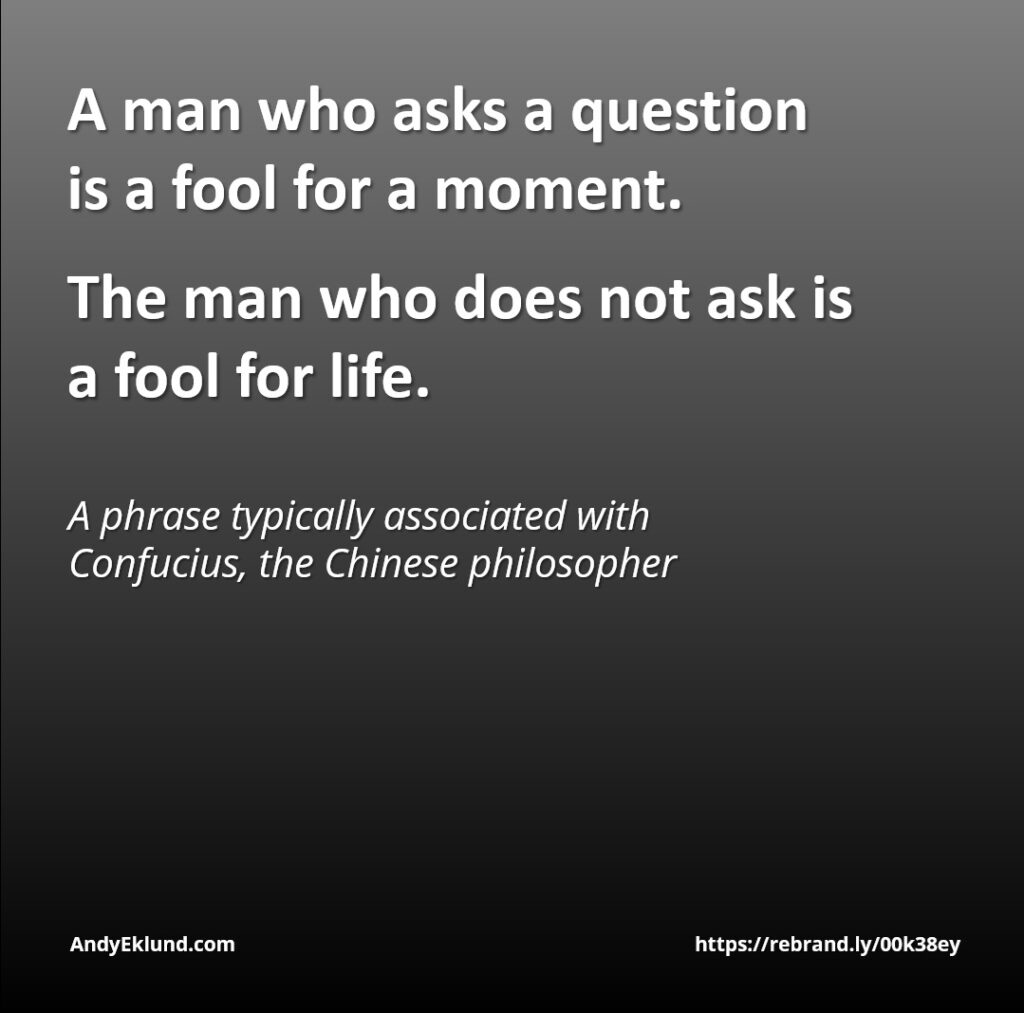It’s hard to under-estimate the value of questions.
They are the most direct and most simple tool to get good information from another person.
Questions are the first sign – if not an essential demonstration – of being creative: one’s curiosity.
We ask questions from the moment we can talk.
They’re a primary way for us to learn. Or engage other people. Or to test what we think we know.
But at the same time, there is no such thing as a question class.
Few of us are taught how to ask a question. Or if we do, it’s usually two not-quite accurate instructions:
1. Start with one of six adverbs: how, what, where, when, why and how. (My chance to link to Kipling’s enduring poem I Keep Six Honest Working Men.)
2. Add a question mark at the end of the statement, and Voilà! A question! (Do you know the official name of a question mark? See far below for the answer.)
Most of us just start asking questions, even though we all know how easy it is to ask a bad question.
And, here’s the thing about bad questions. You always get bad information.
How many of us have asked a bad question at work, which means we got bad information – and then we made a decision based on that bad information?
If you didn’t realise it, questions are everything.
Even more so, asking questions is one of the most important leadership skills anyone can learn.
What Questions Do
Questions are a fundamental part of life. We start asking as children. But we also know that our insatiable curiosity as youngsters shrink as we grow older, to the point we either stop asking questions or, worse, we think we already know the answer.
Perhaps we start to take the value of questions for granted.
Here’s a few truths about questions:
They open the lines of communications between people. They do this by improving the interaction between them, helping understand the other’s issues and priorities, and building rapport and trust. Add in active listening, and you have the potential for agreement and reconciliation.
Learning is impossible without questions. In fact, good questions motivate learners to take pride in what they’ve learnt, if not find ways to put their knowledge and intelligence into action. At a high level of education, you cannot conduct scientific research without them.
They stimulate discussion and debate. More so, good questions demand analysis and understanding of information or a situation, break apart and explain complexity, and mitigate risk by uncovering potential problems.
Questions fuel and motivate all types of thinking. You can start with the big ones necessary for successful businesses: strategic thinking, creative thinking and critical thinking.
Questions help people remember information. They force us to put our thoughts into words. And, by airing our thinking aloud, we test those thoughts for truth and validity. As we hear ourselves and the response from others, questions and answers both help us shape, re-think, emphasis, reposition and summarises what is important.
Amongst all of these, there is now research which shows that asking questions makes us more likeable, encourages intimacy, encourages change and makes us happier overall!
Hale the power of questions!
Oh yes, questions can also be uncomfortable
While questions have many positive aspects, we also need to admit that often questions can have a negative effect.
Questions …
Challenge what we know – or think we know
Test our ignorance
Pick apart assumptions
Expose contradictions
Also, depending upon the situation, the parties involved, and the communications (both verbal and non-verbal), some questions – if not the questioning – can come across as an interrogation. Or, at the least, judgmental. Closed questions in particular are narrow by default, so they actual can limit conversation.
And, let’s also just admit that questions only work if we allow ourselves to acknowledge our ignorance. Who doesn’t like admitting publicly they may be stupid? Aren’t people most comfortable when they firmly believe their own thinking is right? Good questions don’t always allow that sort of comfortableness.
I’d add that good questions can not only be uncomfortable, but they can also inflict damage.
One of the things I’ve learnt as a corporate spokesperson, a negotiator, a teacher and a father: you ruin your reputation if you can’t answer a legitimate question.
Key Lessons on Questions
Two Questions Can Start Most Conversations
Some 2,400 years ago, Aristotle created the basics of persuasion. As part of his theory that influence requires both rational and emotion messages, it also parallels the two best questions to start if you aren’t sure how to understand a problem.
Rational: What do you think?
Emotional: Why do you think that?
Those two questions can be endlessly adapted:
What do you believe? Why do you believe that?
What do you know? Why do you know that?
What is true? Why is that true to you?
What is important? Why is that important to you?
What did you do? Why did you do that?
Or, if you don’t have time for all this preparation, you can get a lot of mileage out of the best question in any language: Why?
Create Questions Which are Enjoyable to Both Parties
It’s not a book people embrace today, but Dale Carnegie’s 1936 classic How to Win Friends and Influence People has one of the best pieces of advice: Ask questions that the other person will enjoy answering. His follow-on point is that enjoyable answers make enjoyable listening.
Listening, of course, a whole different (but relevant) topic.
Most of don’t ask enough questions.
This terrific article The Power of Asking Better Questions from Leadership Review (2018?) points out that most of us don’t ask enough questions. In turn, this causes other problems: missing nuances and not understanding the depth or breadth of a situation or problem, demonstrating a lack of empathy, which in turn limits interpersonal bonding.
They point to four reasons why we don’t ask questions.
Ego – you forget to ask questions because you are so wrapped up in your own fascinating conversation.
Apathy – you don’t care enough.
Lack of confidence – you are worried that you will ask a question that somebody might find offensive or stupid.
Ignorance – you don’t understand the power of questioning.
The internet graciously has added more reasons: fear, workplace culture, busy-ness, misplaced respect.
In this same vein, they also point that many people over-promote themselves in job interviews – meaning, they talk in sentences, not questions. But, by not asking questions, they aren’t getting specific and relevant information, about the position, the organisation or the work itself.
My best retort to people who don’t want to ask questions: You get 100% of what you don’t ask for.
Don’t Ask the Wrong Question
Peter Drucker, one of the greatest thinkers in business, knew the value of a good question.
In his excellent book the The Practice of Management (1954), he gave us clear warning.
“Our most important job is not to find the right answers, but to find the right questions,” he said. “There are few things as useless, if not dangerous, as the right answer to the wrong question.”
Please feel free to add your thoughts and comments below.
And no, I didn’t forget. The formal name of the beautifully designed question mark is an erotreme.



No comment yet, add your voice below!